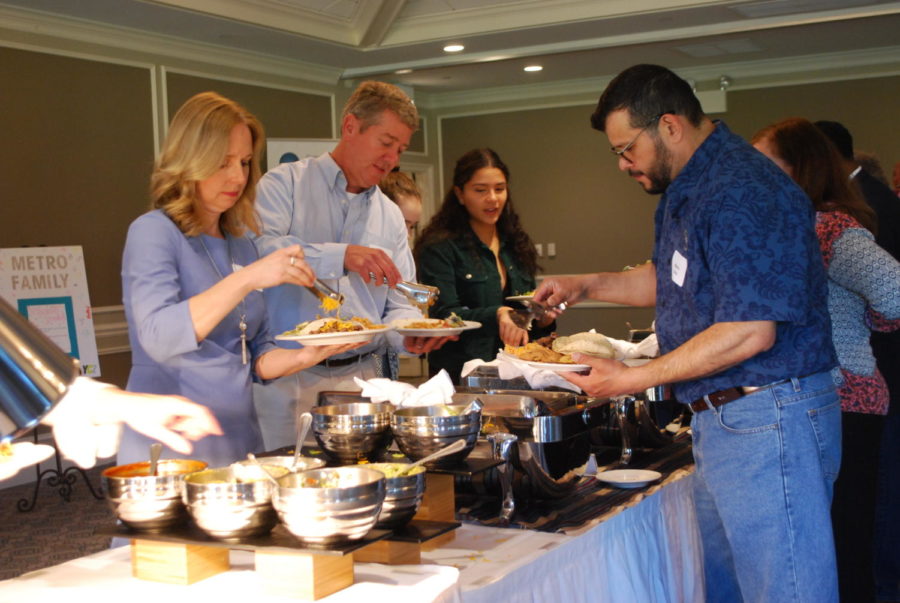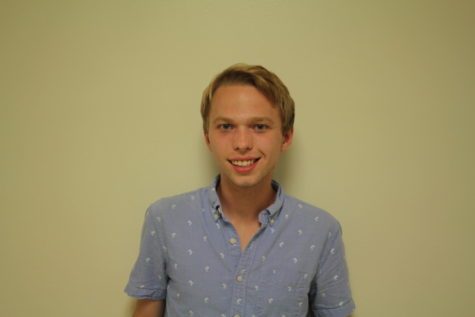Students give grants, learn about philanthropy
The Youth Community Changemaker Program comes to an end, will continue next year
May 6, 2019
From December to March, students from both LT and Nazareth Academy gathered every other week at the Plymouth Place retirement home’s first floor classroom with a goal: determining how they, as students, can work to improve their community.
As part of the brand-new Youth Community Changemaker (YC2) program, the students had the opportunity to dole out three $5,000 grants to Chicago-area nonprofits like Healthcare Alternative Systems, Nami Metro Suburban and Hope for the Day to further their work addressing mental health in the Western Suburbs.
On April 26, the participants assembled at the LaGrange Country Club’s ballroom where the students and their parents dined at circular tables draped with pristine white table cloths. At the center, candy was poured in a sleek transparent cylindrical tube filled with Reese’s, M&Ms and other candy bars. It was as ornate as a vase of candy can be.
Here, they mingled with their friends, their families and the representatives from the three organizations receiving grants from the YC2 students organization. It was, organizers say, a celebration.
“As you can see, we have a lot to celebrate,” program coordinator Beth Murin told the 30 participants and their families at the graduation festivities.
With their sweeping view of the LaGrange Country Club, they gathered to present grants to the three organization and “graduate” from the YC2 program and go off into the world with a greater understanding of what it means to be a philanthropist.
In its first year, YC2—which works to teach teens about the principles of philanthropy—seeks to provide high school students in the Western Suburbs the tools to go into their communities as critical thinkers, advocates for public health and as active members of their community, the organizers said during the event.
Those lessons fit into a broader effort by YC2’s sponsors, the Community Memorial Foundation (CMF), to build a philanthropic culture in this community and transform the Western Suburbs into the healthiest region in the country, Senior Program Officer Tom Fuechtmann said.
“We can not transform our community—we cannot tackle these big problems—alone,” Fuechtmann said. “We have to do it together as a community.”
While many foundations work to better public health, CMF’s philosophy is that these foundations can only go so far, Fuechtmann said.
By empowering members of the community to work for change, they hope to allow people to take these issues into their own hands. With YC2, Fuechtmann said that they hope these youth take that knowledge and use it to better their community.
“We have to build a culture of philanthropy not just among these foundations but among everyone,” Fuechtmann said. “One of the ways we’re doing that is is by, hopefully, inspiring young people to become philanthropists and teach them what philanthropy means.”
Prior to giving out grants, the students were taught the differences between charity and philanthropy, participants said.
According to the students, charity is a temporary fix to a problem, such as giving a hungry person food. In contrast, philanthropy is giving individuals the tools to do that on their own, making them less reliant on charity. That philosophy bleeds through into how YC2 teaches the value of philanthropy.
Participant and LT student Owen Kartheiser ‘20 noted that, while YC2 worked to teach them all of these lessons, it was up to the students to apply it as they saw fit.
“This is one of the first times we were seen as adults, rather than children,” Kartheiser said. “They weren’t holding our hand. They taught us this information but we had to use that knowledge ourselves.”
Participants took that information and used it to determine where their three $5,000 grants could be used to better mental health in the community, YC2’s curriculum developer and facilitator Abbey Kutlas said.
“They really took the time to pull apart all of these details,” Kutlas said. “I really applaud them for not becoming so singly focused on something that is just going to benefit them, but really saying, ‘This is something that we really see in our community.’”
The participants were given access to information from the Community Memorial Foundation’s Health Dashboard, providing the participants with data about a variety of health issues in the community, such as the prevalence of certain diseases and hospitalization rates for issues such mental health.
This information helped the participants make data-driven decisions about how to address the health issues occurring in the community, Kutlas said. After analyzing the information, the participants decided to use the grants to help tackle mental health in the Western Suburbs, Kutlas said.
At first, the organization received 19 grant proposals, which were then narrowed down to five foundations the participants could research further. The participants then visited those organization and asked the foundation’s employees questions about how the organization would use this money to better their community.
Fuechtmann, who goes on around 25 to 30 grant visits a year, said that the students were as tough on the organizations as he is.
“The students that participated in this program, they asked as hard [of] questions—or even harder—in their site visits as I do in mine,” Fuechtmann siad. “I think that is a testament to their intelligence, their preparedness and their dedication to this program.”
With the number of youth driven movements—such as the Parkland school shooting survivors—capturing the national political attention, Kutlas thinks that it may be time to give young people the opportunity to play an active role in their communities. Fuechtmann thinks YC2 helped students do that, he said.
“What this program did is empower young people to make a change in their own community. It gave young people the opportunity to have a real world experience,” Fuechtmann said. “We need to trust young people and give them tools to make change and step back and let them do it.”
As the event came to a conclusion, a number of participants ran to the organizers to thank them for their mentorship over the course of the entire program. At the end of its trial year, the organizers said that they plan to offer YC2 next year for students at LT and Nazareth Academy. Fuechtmann hopes to offer it to students at other schools as well, he said.
“YC2 showed me that we are a lot more grown up than people perceive us to be,” participant Charlie Corrigan ‘19 said. “There are so many people defying certain standards, that just shows me that there is so much hope for our generation. It taught me a lot about giving back.”





















![Movie poster for '[Rec]" (2007).](https://www.lionnewspaper.com/wp-content/uploads/2023/04/rec-640x900.jpg)



